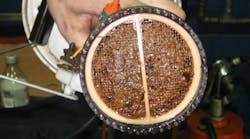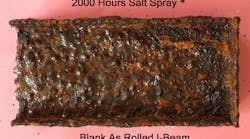Corrosion poses a large and costly problem for fleets. Experts estimate that it costs fleets across the United States and Canada more than $25 billion annually.
Corrosion not only forces fleets to manage a range of expensive and time-consuming maintenance tasks, it also can lead to over-the-road dangers for fleet drivers and the passenger cars that share the road.
So what causes corrosion? The number one factor is exposure to moisture. Trailer areas that are particularly vulnerable include tight seams, or anyplace two metals meet – where the bottom rail of the trailer is riveted or bolted to the steel cross members, for example.
Road salt and de-icing agents also can lead to corrosion, presenting potential problems for electrical connections and wiring, as well as nuts, bolts, battery straps and more.
Out on the open road, some degree of corrosion is inevitable. But using a rust inhibitor or salt eliminator can help to reduce it and ultimately increase the service life and safety of your fleet.
SLOW IT DOWN
As their name implies, rust inhibitors are applied to slow down or inhibit vehicle corrosion. It is moisture that causes corrosion to develop, often in tight areas.
Accordingly, if a rust inhibitor is to be effective, it must be thin enough to get into any spot that water can, including seams and spot welds.
SKF’s Krown rust inhibitor, for example, is a solvent-free solution that easily penetrates small seams and hard-to-reach areas. The product is eco-friendly and contains no toxins, so any excess dripping or run-off during application will not harm the environment.
Road salts and de-icing agents contain calcium, magnesium and sodium chlorides, all of which are highly reactive and tend to cling to trailer wiring. The result? Corrosion on weather packs, and the costly failures that can follow.
The application of another product in SKF’s line of rust protection products, Krown Salt Eliminator, effectively can prevent the build-up of corrosive chemicals on trailers, in turn reducing corrosion-related failures. This product is most commonly applied during winter months, when road salts and de-icing agents are prevalent.
ATTACK CORROSION PROACTIVELY
Along with applying a rust inhibitor or salt eliminator, implementing routine corrosion checks and a maintenance program offers a proven option for preventing corrosion – one that can help boost fleet uptime and cut overall maintenance costs.
SKF recommends the following preventative maintenance steps:
- Soak the vehicle down with a detergent, then power wash it thoroughly to help reduce the ability of chemicals and other debris to draw moisture in and accelerate corrosion.
- Remove de-icing agents using Krown Salt Eliminator so that they dissolve quickly and prevent further corrosion.
- On electrical system problem areas, apply a corrosion inhibitor with high dielectric strength. Such areas include, but are not limited to plugs, the ECU, wiring harnesses, battery terminals and exposed wiring. These lubricants also can be used to protect the body, chassis, dump beds, salt spreaders or moving parts.
GO SOLVENT-FREE
To prevent corrosion most effectively, experts recommend using a solvent-free rust inhibitor. That’s because solvents can damage paint, plastic and rubber, leaving surfaces brittle and even more susceptible to corrosion damage.
Exposure to solvents is also harmful for users and the environment.
Unfortunately, 95 percent all rust inhibitors on the market contain such solvents, so fleet operators and maintenance teams should choose only the highest performing, solvent-free rust inhibitor. Doing so will help reduce down time, maintenance costs and, of course, corrosion damage.
John Heffernen, is the national fleets sales manager for SKF's vehicle service market. SKF (www.skf.com) is a leading global supplier of bearings, seals, mechatronics, lubrication systems and services.





